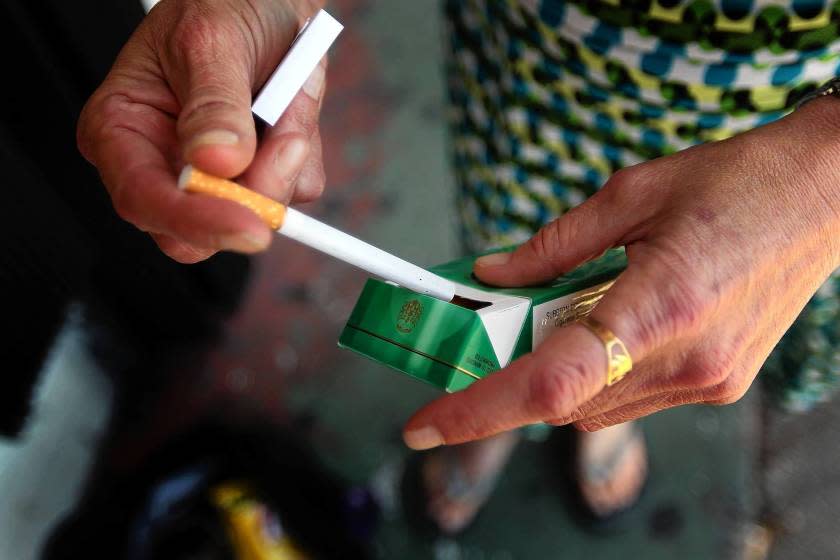Op-Ed: Big Tobacco helped destroy Black Americans' health. Banning menthols could help improve it

Recall with us the chilling scene in the 1972 film “The Godfather” in which a Mafia don prohibits his people from selling drugs to anyone except “the dark people, the coloreds — they’re animals anyway, so let them lose their souls.” As the California Legislature considers a bill prohibiting the sale of flavored tobacco products, will it show the same contempt for the health of the state’s Black population?
In this year of racial introspection, it should not be possible. But history tells a different story.
Big Tobacco has successfully conducted a decades-long campaign to lure and hook Black smokers by marketing menthol-infused products specifically to Black consumers. They have helped destroy Black health in the process — a whopping 85% of Black Americans who smoke use mentholated cigarettes, or menthols.
Senate Bill 793 would make it illegal for stores to sell flavored tobacco products, including menthol-flavored vaping cartridges and cigarettes. Introduced early this year, the bill is scheduled to be taken up soon by the state Assembly Health Committee.
At a time of national reckoning over the mistreatment of Black people, Black leaders in the state have largely stayed silent — including members of the California Legislative Black Caucus — regarding this matter critical to Black health.
This has left the door open for the powerful industry lobby to protect its pipeline of new, young Black tobacco users. About 70% of Black Americans ages 12 to 17 who smoke use menthol cigarettes, the Campaign for Tobacco-Free Kids reports.
Menthols’ numbing sensation makes smoking seem less harsh and leads smokers to consume more tobacco because it is more palatable. This effect also makes menthols more enticing to youth who are also more susceptible to both the addictiveness and harm of nicotine.
The tobacco companies have a long history of aggressively marketing deadlier menthol tobacco products to the Black community. Many Black Americans over 30 have distinct memories of menthol ads on the radio and in magazines and newspapers. For decades, tobacco companies sponsored concerts and other events to push menthol sales.
This effort has had a devastating and measurable effect. Black Americans have the greatest burden of tobacco-related mortality of any ethnic or racial group in the U.S., according to the Centers for Disease Control and Prevention. Tobacco use is a major contributor to the three leading causes of death among Black Americans — heart disease, cancer and stroke.
For us and so many others, the tobacco-related death toll is personal. Rev. Cager saw his big brother Rob get hooked early on menthol cigarettes and die of lung cancer. He was only 58.
Big Tobacco is not just good at creating carcinogenic addictions. It also excels at getting its way politically by reaching into its deep pockets and contributing to political campaigns — and deploying specious arguments. For instance, the National Assn. of Tobacco Outlets claims that banning the sale of menthol tobacco products could criminalize their possession even though the bill would allow for personal possession and use of these products. The state legislation clarifies what products retailers can sell.
A fellow reverend has presented perhaps the most offensive argument defending Big Tobacco — that smoking is a “choice” Black people are entitled to make. Through fierce marketing, Big Tobacco is choosing a lethal addiction for them.
Within faith communities, there is growing concern that our elected leaders — in Los Angeles and the state — might allow the industry’s influence to "Trump" the issue of Black health. We capitalize the “T” here because if legislators do exempt menthol products from their ban, they will be echoing the stance of the president, who early this year said that he, too, would exclude menthol from any ban because “it’s a big industry” and “we want to protect that industry.”
Jurisdictions throughout California have dealt decisively with the vaping crisis by passing comprehensive bans, in part out of concern for the health of the Black community. Long Beach, Oakland, Burbank and Carson have restricted the sale of menthol cigarettes and are among the vast majority of the nearly 80 cities and counties in the state that have done the right thing and ended the sale of menthol and other tobacco products.
California should ban the sale of all flavored tobacco — including menthol cigarettes — and help right a historic wrong that for far too long has allowed the tobacco industry to jeopardize the health of Black Americans.
The Rev. John E. Cager III is pastor of Ward African Methodist Episcopal Church in Los Angeles and president of the Los Angeles Council of Religious Leaders. The Rev. Peter Laarman is a retired United Church of Christ minister.

